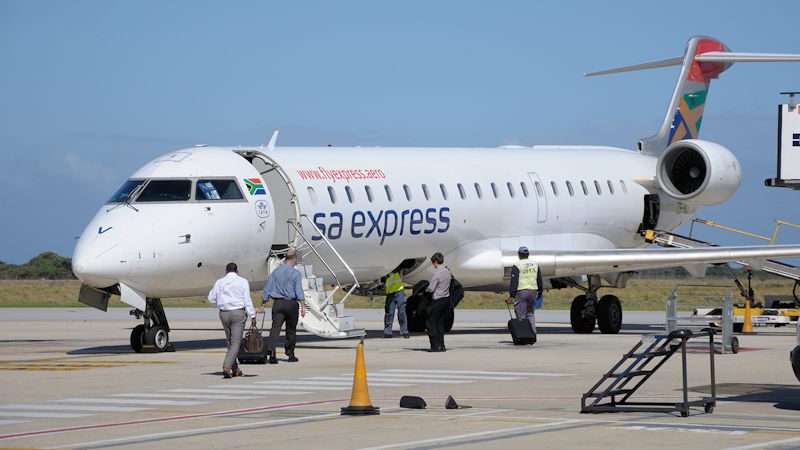Every passenger on every South African Express (SAX) flight is obscenely subsidized with money diverted from poverty relief and taxpayers by approximately R3,850 (R7,700 return). Assuming 50 passengers per flight on average, this is the equivalent to two RDP houses for every one-way SAX flight and four houses for a return flight. The state-owned airline has been generating losses funded by the poor since 2011. And in contravention of the Public Finance Management Act (PFMA), it has failed to produce Audited Financial Statements (AFS) since 2016. But this has gotten worse.
Irregularities in Pricing
Poverty generating SAX may be using illegal predatory pricing to undermine private airlines. Minister Pravin Gordhan and the Department of Public Enterprises (DOE) should end this public disgrace by terminating financial support for failed nationalized airlines at the expense of poor South Africans. The audacity of the South African Airways (SAA) bailouts has monopolized media and political attention.
Meanwhile, SAX flies under the radar avoiding public outcry and its bankruptcy while gobbling tax revenues and relying on bankers seduced into ignoring commercial reality. SAA grabs the headlines by the sheer size of the money wasted on the poor, who do not fly, subsidizing the rich, who do fly. But, proportionately, SAX is worse than SAA.
Poor Returns Despite Bailouts
Between August 2018 and July 2019, SAX received at least R1.54 billion in bailouts; R1.24 billion from the government on November 2018 and, more recently, government-guaranteed funding of about R300 million.
During this period, SAX carried fewer than 400,000 passengers, which amounts to R3,850 per passenger one-way and R7,700 return. In response to this, Executive Director of the Free Market Foundation (FMF), Leon Louw said,
Every person who flies SAX must look down as they fly over conspicuously poor settlements and reconcile their conscience with the implications of their ticket. Every time you are at an airport and see a SAX plane take off, think about the subsidy that you are paying to enable rich people to fly while tax-payers are fleeced and the poor are denied services, housing, and welfare. It is immoral and obnoxious.
According to a 2018 Report of the Standing Committee on Appropriations on the Adjustment Appropriations Bill, SAX said it would make a loss of R669 million in 2019. Industry experts, however, believe this could be closer to R1 billion.
In a December 2018 interview with the Citizen, SAX CEO, Siza Mzimela, admitted that SAX would compete directly with private competitors by offering prices between 35 percent to 55 percent lower than its rivals on targeted routes. Such predatory pricing is possible only by fleecing taxpayers and the poor. Such shameless temerity is an attack on private, tax-paying, employment-generating airlines and runs contrary to the government’s promises about supporting private enterprise, creating jobs, and generating revenue.
Mzimela also made the implausible promise that, in April 2019, SAX would make more profit than it has in recent years—South Africans patiently await the miracle.
Auditing Problem
SAX failed to issue 2017, 2018 and 2019 financial statements, apparently because of its inability to obtain an unqualified audit. This may date back to 2010 when SAX recorded a spurious profit by some dubious revaluation and re-classification of its asset register. This was exacerbated by a pay-out of about R11.5 million in executive bonuses, of which R3.2 million went to Siza Mzimela herself, bringing her total 2010 remuneration to R5.2 million (R8.5 million inflation-adjusted).
This could be verified in the 2010 AFS, but they were dubiously deleted from the SAX website. Fortunately, the FMF had the foresight to download a copy.
Apparently, SAX instigated a forensic audit to investigate the accounting irregularities and possible fraud allegations told to the Zondo Commission into state capture. The investigation must go back to 2010 if it is to have any validity.
In the public interest, the FMF submitted a PAIA (Promotion of Access to Information Act) request on 31 May 2019, demanding relevant information, financial statements for 2017 and 2018, and management accounts to March 2019. The FMF will also be submitting an SAA PAIA request. Since SAX ignored its legal obligation to respond, the FMF is taking legal action on behalf of all South Africans.
The FMF is an independent, non-profit, public benefit organization, created in 1975 by pro-free market business and civil society national bodies to work for a non-racial, free and prosperous South Africa. As a policy organization, it promotes sound economic policies and the principles of good law.

